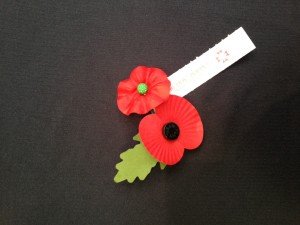
By Lt Col Fiona Galbraith
J5 Strategy, Plans and Programs Directorate, Headquarters United States Africa Command
The Veterans of Foreign Wars gave out Buddy Poppies to passers-by at key locations around the U.S. Army Garrison Stuttgart, Nov. 7-8, 2015. This year, the VFW was also joined by a member of the British Army, offering the Royal British Legion poppy as well.
The tradition of using the poppy as a symbol of remembrance started in the United Kingdom, Canada and the United States shortly after the First World War, and has continued ever since.
Lt Col Galbraith, a British Army officer serving as an exchange officer with United States Africa Command in Stuttgart said, “Our soldiers, sailors and airmen have been fighting shoulder-to-shoulder for over a century and sadly many have also died together. It is therefore the duty of the younger generations to keep their memory alive and to strive together to avoid falling into a state of global war ever again.”
“It was such a pleasure to spend time with US veterans aged up to seventy as well as with young volunteers from the JROTC. We learned a lot from talking to each other,” Galbraith added.
Why is the poppy a symbol of remembrance?
When the guns fell silent across Europe at the eleventh hour on the eleventh day of the eleventh month in 1918, flowers started to grow on the muddy, torn up battlefields. The most prominent was the poppy; within days, the new silence of peace was clothed in a sea of red poppies.
A Canadian doctor, Lt Col John McCrae, inspired by the sight of poppies whilst tending the wounded in Flanders Belgium earlier in the war, had written the immortal poem, “In Flanders Field”. This beautiful verse captures the sacrifice made by the millions of young men who died and, in the final verse, makes it plain that the duty to defend our common values is shared down the generations.
In Flanders fields the poppies blow
Between the crosses, row on row,
That mark our place; and in the sky
The larks, still bravely singing, fly
Scarce heard amid the guns below.
We are the Dead. Short days ago
We lived, felt dawn, saw sunset glow,
Loved and were loved, and now we lie
In Flanders fields.
Take up our quarrel with the foe:
To you from failing hands we throw
The torch; be yours to hold it high.
If ye break faith with us who die
We shall not sleep, though poppies grow
In Flanders fields.
Navy veteran, and Senior Vice Commander of VFW Post 10810 Stuttgart, Joe Holder said, “Next year we’ll tell everyone in advance that this is a shared effort between the US and Britain.”
The “Kohima Epitaph,” originally composed to remember fallen soldiers in Burma, is today used in acts of Remembrance around the world: “When you go home, tell them of us and say, that for your tomorrow, we gave our today.”
On Nov. 11, Veteran’s Day (US) and Remembrance Day (UK), we remember the sacrifices of those who fought but did not return and then focus on the veterans who did come back, especially those who have found life difficult on their return. British and U.S. personnel alike, serving together here in Stuttgart are proud to continue this long tradition.






